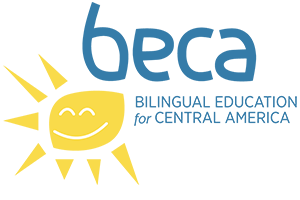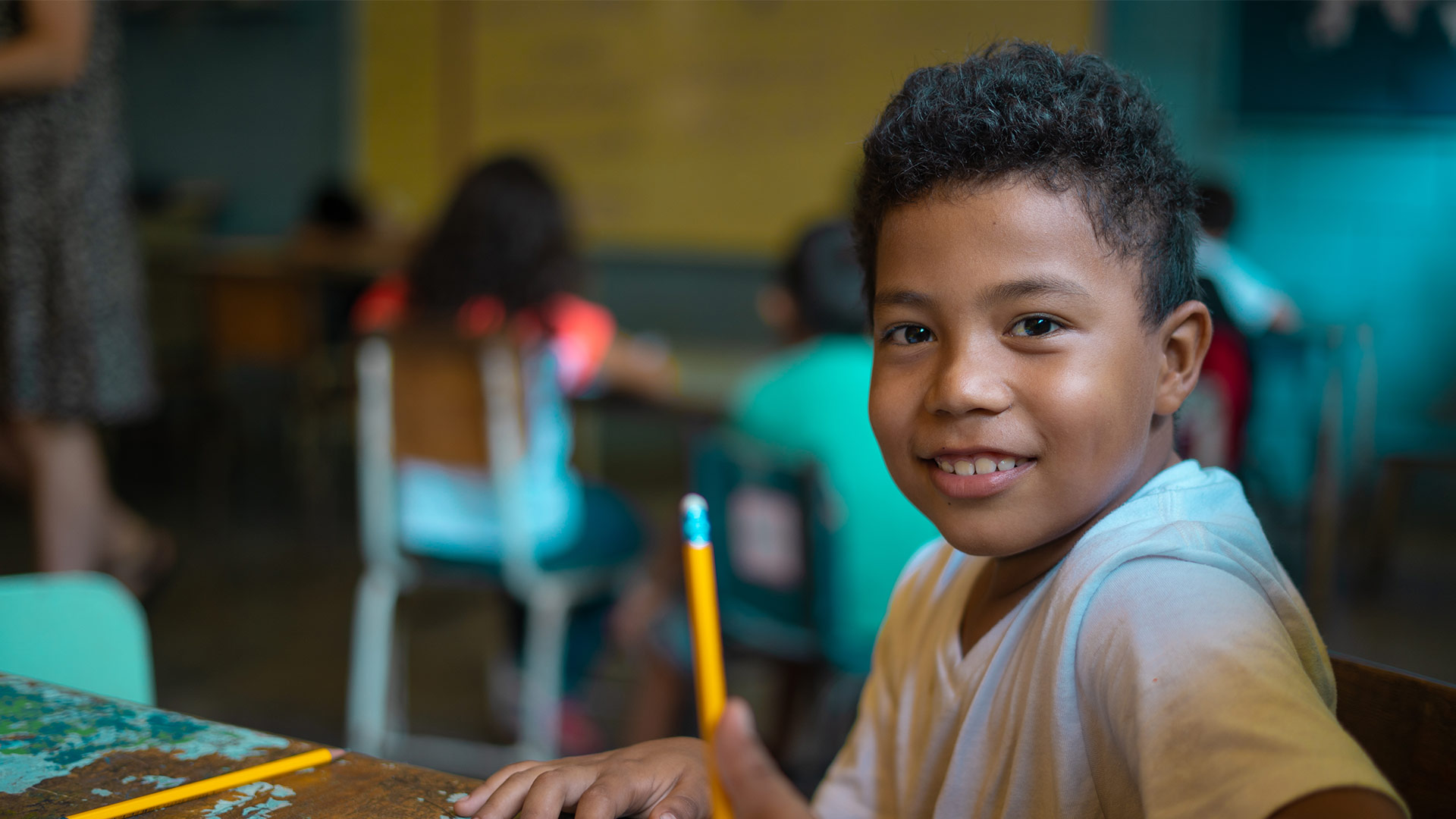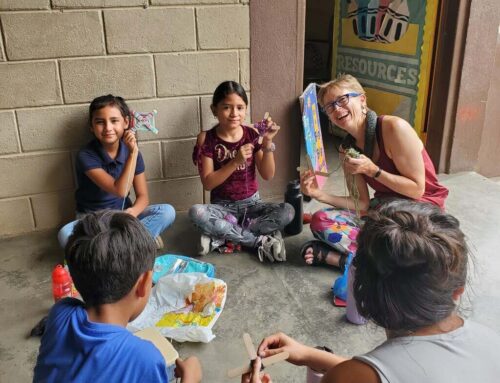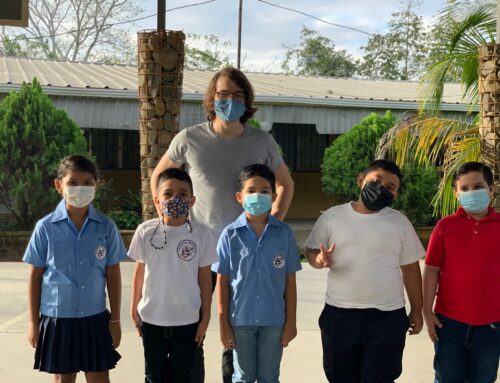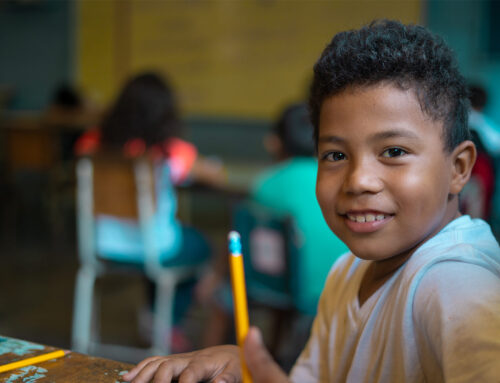Molly Cooksy was sitting in her friend’s living room when she first heard about BECA and decided to apply. Along with four other teachers, Molly’s had the unique experience of teaching at BECA’s newest school, Amigos de Jesus, where her class is composed of kindergarten students from the ADJ orphanage home (hogar) and from the neighboring areas. Molly says, “ADJ has created a beautiful and constantly growing community here, and I am very grateful to be a part of it.” Read more to find out about Molly’s year in Macuelizo, her favorite parts of Honduras, and the advice she has for anyone interested in applying!
Can you describe the Amigos de Jesus school for people who aren’t familiar with the new addition to BECA’s schools?
The partnership between BECA and ADJ is only a couple of years old. Amigos de Jesus already had a school which offered a few different programs for children of the hogar. Over the last two years, BECA and ADJ have teamed up to create a strong bilingual program for both students from the hogar as well as from the neighboring communities. This year we had grades K – 3, and the goal is to add a new grade each year. All of the BECA classes have a mixture of hogar and vecino children, and Honduran and BECA volunteers use the same spaces to teach. This means that BECA teachers are working closely with Honduran volunteers, ADJ volunteers, parents, and hogar staff.
What is your favorite place that you’ve visited in Honduras?
Aside from the Amigos de Jesus hogar, I really enjoyed Santa Rosa. So many of its streets were lined with market stalls throughout the day, or little hole-in-the-wall places to duck in and check out. It was a lot less dusty and crowded than other parts of Honduras I had traveled to, but was still a nice break from the quiet of the hogar. Everyone was kind and hospitable, and there were real coffee shops with real coffee (a break from granitas, por fin!) and places to sit and relax. There was a lot to explore – I’d really like to get back there before I go.
Describe your typical weekend.
I normally stay home at the hogar. It’s quiet here, and some of my best “friends” live right across the lawn from me (and by friends, I mean my students). Friday nights are for Netflix and eating popcorn. Always. I try to give myself at least a full day over the weekend to focus on myself or do things unrelated to school. I Skype my family, get laundry done in the pila out back, or hang out in the hammock. If the weather is nice and I need to stretch my legs, I walk down to Posas Verde, the little town I live in, or Macuelizo nearby. There are a few pulperias there and being out here in the countryside guarantees amazing views. Sometimes I will go to prayer circle with my students or pass by the hogar to play. There is usually a soccer game to watch or little kids sliding down the hills on big plastic bottles who want to show off.
What is your favorite part of the day or class to teach?
My favorite class to teach varies depending on what unit I’m working on. Usually we have the most fun in science. Prepa got very excited about our animals unit, and we made animal masks and learned Old MacDonald, complete with animal noises. Science is where all the best songs, games, and centers happen. There’s also the smallest gap in comprehension, so my students who often struggle participate much more. Watching everyone have fun and get excited about learning is the whole point.
How did any preconceived notions you had about Honduras compare with what you found when you arrived here?
It’s hard to remember what I expected before coming down here. I knew that I would be living at the hogar, so I mostly thought about what that would look like. It’s very similar to a lot of places around where I’m from: farms, small town centers, not a lot of people. That made the transition a lot easier. I guess the biggest surprise was the number of gringo and European expats I have met. Honduras always came up in conversation as “the most dangerous place in the world” and hearing that all the time led me to assume that not a lot of tourists would come here. Some of them have been fellow bilingual teachers, but a lot of them have really settled down here, or at the very least are not just passing through.
How has your experience living in Macuelizo and working at ADJ been?
I’ve loved it. Growing up in a small rural town, I always thought I’d hightail it to the city, but I actually enjoy being out here in the “boonies.” The school is part of the same property I live on, so it is easy for me to go back if I forget something or want to spend some quiet time working there over the weekend. I live right next to a lot of my students, so I can spend time with them outside of school, but I also have my own space if I need to take a break. The property of the hogar is pretty big. There are beautiful places to walk, and often there are rides to the larger neighboring towns if I want to check if civilization is still there or go pick something up from the supermarket. ADJ has created a beautiful and constantly growing community here, and I am very grateful to be a part of it.
What’s the funniest thing a student has ever said?
Several of the older students have started to abbreviate their Spanish words, I think in hopes that it will be the English word. Emma has pointed out that gringos do this by adding an “o” or “a” to English words in hopes that it will be Spanish. We’ve had gems from third and second grade such as: “I left my tar in the cuart,” (she left her homework in the room), “It was just a brome,” (it was just a joke), “Do I close the puert?” (close the door), or “Cuid it for me!” (watch that for me!). It adds a whole new level to translating their English into English, especially because they say it with a United States accent.
What’s the funniest thing that’s happened outside of school?
The BECA and ADJ volunteers got together to do a Secret Santa gift exchange to celebrate Christmas. Everyone had pulled names a couple weeks before and we hosted the dinner party at the BECA house. I thought we would just hand our gifts out and listen to music and eat. But the Hondurans had the idea of blindfolding each person one at a time, and having to guess who was giving them their gift by touching their hands and faces. It was hilarious to watch the teachers accidentally stick a finger in a nose or eye, or get caught in hair, and the gift-giver taking it like a champ, trying not to laugh and give it away. Especially the look on one teacher’s face when she realized she had been poking and pulling the school director’s face for 3 minutes. It was a fun way to do it and to break the ice a little.
What is the most challenging aspect of living in Honduras?
Going out and about being a woman. It’s more than unfortunate that I am constantly aware of how my gender makes me less safe. I like to be on my own, but I rarely travel far outside of the home by myself because of it. I don’t mean to say that the machismo culture only exists here, but it’s definitely influenced this year for me.
What’s your favorite Honduran food?
Tamales! I think it’s the texture of the corn meal, plus they’re so handily wrapped up and easy to carry; a winning combination (perfect for chicken bus rides).
Have you ever had any visitors?
I have not had any visitors, but a couple of the other teachers at ADJ have. I think the general consensus is that we live in an amazing place. No one can spend time with our students and not be immediately won over. Apprehension about the location (Honduras) is often there, but the positives of the program and the general tranquility of the home outweigh the negatives. Most people have come back multiple times while I’ve been here, which is very cool to see.
How did you find out about BECA?
The ADJ BECA administrator (Natalia) is a friend of mine from college. I was sitting in her living room in Worcester, MA whining about not knowing what to do with my life and she opened up the website and suggested I apply. So I did!
How do you relax and decompress when you’re not in school?
As previously mentioned, I watch Netflix. We also have really nice hammocks on our back porch, so sometimes I’ll read out there. If it’s sunny and nice out, I’ll spread a towel in the grass and read a book or listen to music. Doing laundry in the pila or puttering around the house can also be cathartic at times. It feels good to be productive outside of school, especially when it starts to feel like productivity does not exist outside of school.
How would you describe your class?
I have the funniest group of kids. Some of them are from the hogar and some are from neighboring towns, so it’s interesting to see them socialize with and learn about each other (Prepa is a good age for that). There have been some unlikely friendships and even romances (gotta love the drama). They have caught on to English so quickly, and they love to drop English words in their monologues about pools, bicycles, and popcorn to me. I’ve got a few tough-guy characters, a couple mini-academics, some total goofballs who cannot, for the life of them, stop moving or touching each other, and then the quiet and patient ones. I love watching them figure themselves (and me) out. I really wish we had more time to just hang out.
How would you describe the experience of working with BECA and living in Honduras for someone thinking about applying?
It sounds so corny, but I’ve described it multiple times as one of the hardest things I’ve done, and therefore one of the most rewarding. This year has convinced me that I want to pursue teaching as a career, even with the late nights spent planning, and the rough moments with different behaviors. There is so much I could say about it! I would say if you want to take a step outside your comfort zone, work with some brilliant and astonishing children, and learn about a different part of world, apply.
